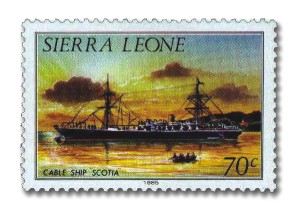| |
Letter
from Sierra Leone
In
Greene's Freetown HopeTriumphs
Parvez
Khan
Fifty-four
years after he presented readers his oft-referred novel,
I took a long flight from New York and headed for the place
that I never thought I would ever find myself in. After
stopovers and switching flights in Paris, the Mauritanian
capital Nouakchott, and a very romantic-sounding Conakry,
the capital of Guinea, I finally boarded a giant helicopter
that flew me into Freetown. It's been more than a year now;
I am in Graham Greene's Sierra Leone.
The country's decade-long civil war was declared over in
January 2002. The once-feared Revolutionary United Front
rebels metamorphosed themselves into a political entity,
and after much suspense, opted to participate in the nation's
first post-war elections. Their performance was decisively
poor, and not surprisingly, Ahmed Tejan Kabbah won a handsome
second term. Slowly, things have started shaping up.

Freetown still has an eerie resemblance to what Greene described
in his Heart of the Matter. Foun-ded in 1787 as a colony
for the freed slaves and finally granted independence in
1961 by the British, a colonial aura still hangs over Sierra
Leone's capital city. You walk down the narrow lanes and
notice their English names. Small hamlets surrounding Freetown
would make you think as though you were crisscrossing England:
Leicester, Gloucester, Sussex, York, Kent and so on. Right
at the city-centre there is a huge 500-year-old cotton tree.
The earliest settlers who came to Freetown are said to have
spent their first night under the tree. Recently some people
wanted to cut it down, as they considered it to have brought
misfortune to the country. A few yards from the cotton tree
is the Law Courts building which houses Sierra Leone's higher
judiciary. You meet Chief Justice Abdulai Timbo in his small,
almost non-descript chambers and come out admiring him for
running the show with barely any resources. And Freetown
boasts having Fourah Bay College, West Africa's oldest university
founded in 1827.
Rebels invaded and destroyed part of Freetown in 1999. People
were lined up and killed. And yet, astonishingly, when you
meet people, their disarming smile will make you appreciate
the power of forgiveness and reconciliation. They would
unfailingly greet you saying “how di body”, meaning how
are you, as if they knew you fairly well. Officials, mercifully,
do not suffer from typical third world protocol syndrome.
I just had to call State Chief of Protocol Suley Daramy
to be able to greet the President at his modest hill top
lodge on the Eid day. Ministers are willing to meet you
at short notice. I was quite surprised when Ernest Bai Koroma
who is leading the Opposition in Parliament gladly joined
me for a lunch over a telephone request. All of them are
genuinely warm, willing to talk about their struggle and
aspirations, and somehow you develop an instant personal
rapport.
Freetown is slowly shedding off its war-torn look. Bazaars
are again full of bustle and noise. Packed minibuses with
colourful philosophical slogans like "the gate of hell
is money" or "no success without labour"
literally crawl on city streets. Along the beach one now
has the luxury of a few makeshift restaurants and bars.
A few mini supermarkets have cropped up, all owned by Lebanese.
A newcomer would be surprised to see that almost all the
cars on the streets are Mercedes: five thousand dollars
would fetch a decent used one, imported from Europe.
Pundits from the outside world are often sceptical about
Sierra Leone's future. True, despite its rich mineral resources
the country is the poorest in the world. Yes, its diamonds
are a curse, as they have fuelled conflict in the past.
But then the war has wasted a generation that is almost
lost and cannot be expected to quickly match the pace. One
has to accept it-- development will take some time. The
other day, I saw a girl with her little brother in front
of my house. Electricity, as usual, was gone and the generator
was on. I walked close to her and had found her doing homework
in the dim light coming out of a hole in the gate. And I
knew instantly Sierra Leone has a future.
|

